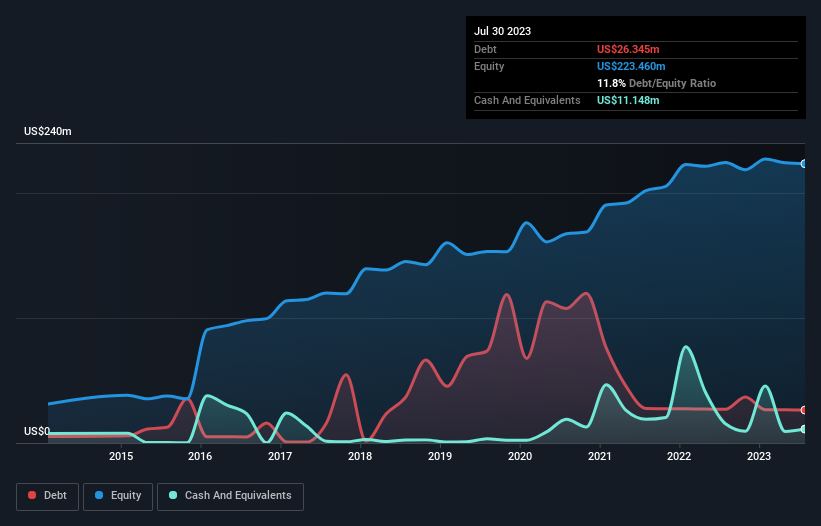- United States
- /
- Specialty Stores
- /
- NasdaqGS:DLTH
Health Check: How Prudently Does Duluth Holdings (NASDAQ:DLTH) Use Debt?
Legendary fund manager Li Lu (who Charlie Munger backed) once said, 'The biggest investment risk is not the volatility of prices, but whether you will suffer a permanent loss of capital.' It's only natural to consider a company's balance sheet when you examine how risky it is, since debt is often involved when a business collapses. Importantly, Duluth Holdings Inc. (NASDAQ:DLTH) does carry debt. But should shareholders be worried about its use of debt?
What Risk Does Debt Bring?
Debt assists a business until the business has trouble paying it off, either with new capital or with free cash flow. Part and parcel of capitalism is the process of 'creative destruction' where failed businesses are mercilessly liquidated by their bankers. However, a more usual (but still expensive) situation is where a company must dilute shareholders at a cheap share price simply to get debt under control. Having said that, the most common situation is where a company manages its debt reasonably well - and to its own advantage. The first thing to do when considering how much debt a business uses is to look at its cash and debt together.
View our latest analysis for Duluth Holdings
How Much Debt Does Duluth Holdings Carry?
As you can see below, Duluth Holdings had US$26.3m of debt, at July 2023, which is about the same as the year before. You can click the chart for greater detail. On the flip side, it has US$11.1m in cash leading to net debt of about US$15.2m.

How Healthy Is Duluth Holdings' Balance Sheet?
We can see from the most recent balance sheet that Duluth Holdings had liabilities of US$107.2m falling due within a year, and liabilities of US$172.4m due beyond that. Offsetting these obligations, it had cash of US$11.1m as well as receivables valued at US$7.78m due within 12 months. So it has liabilities totalling US$260.8m more than its cash and near-term receivables, combined.
Given this deficit is actually higher than the company's market capitalization of US$216.6m, we think shareholders really should watch Duluth Holdings's debt levels, like a parent watching their child ride a bike for the first time. Hypothetically, extremely heavy dilution would be required if the company were forced to pay down its liabilities by raising capital at the current share price. The balance sheet is clearly the area to focus on when you are analysing debt. But ultimately the future profitability of the business will decide if Duluth Holdings can strengthen its balance sheet over time. So if you want to see what the professionals think, you might find this free report on analyst profit forecasts to be interesting.
Over 12 months, Duluth Holdings made a loss at the EBIT level, and saw its revenue drop to US$652m, which is a fall of 4.2%. That's not what we would hope to see.
Caveat Emptor
Importantly, Duluth Holdings had an earnings before interest and tax (EBIT) loss over the last year. To be specific the EBIT loss came in at US$2.7m. Considering that alongside the liabilities mentioned above make us nervous about the company. We'd want to see some strong near-term improvements before getting too interested in the stock. Not least because it had negative free cash flow of US$1.2m over the last twelve months. So suffice it to say we consider the stock to be risky. When analysing debt levels, the balance sheet is the obvious place to start. However, not all investment risk resides within the balance sheet - far from it. Be aware that Duluth Holdings is showing 1 warning sign in our investment analysis , you should know about...
If, after all that, you're more interested in a fast growing company with a rock-solid balance sheet, then check out our list of net cash growth stocks without delay.
New: Manage All Your Stock Portfolios in One Place
We've created the ultimate portfolio companion for stock investors, and it's free.
• Connect an unlimited number of Portfolios and see your total in one currency
• Be alerted to new Warning Signs or Risks via email or mobile
• Track the Fair Value of your stocks
Have feedback on this article? Concerned about the content? Get in touch with us directly. Alternatively, email editorial-team (at) simplywallst.com.
This article by Simply Wall St is general in nature. We provide commentary based on historical data and analyst forecasts only using an unbiased methodology and our articles are not intended to be financial advice. It does not constitute a recommendation to buy or sell any stock, and does not take account of your objectives, or your financial situation. We aim to bring you long-term focused analysis driven by fundamental data. Note that our analysis may not factor in the latest price-sensitive company announcements or qualitative material. Simply Wall St has no position in any stocks mentioned.
About NasdaqGS:DLTH
Duluth Holdings
Sells casual wear, workwear, outdoor apparel, and accessories for men and women in the United States.
Adequate balance sheet and slightly overvalued.
Similar Companies
Market Insights
Community Narratives



